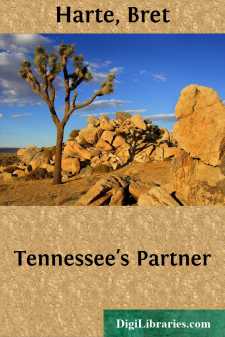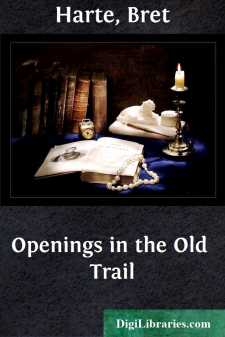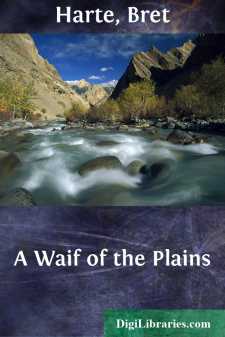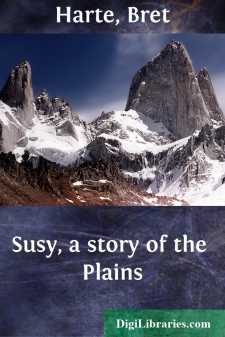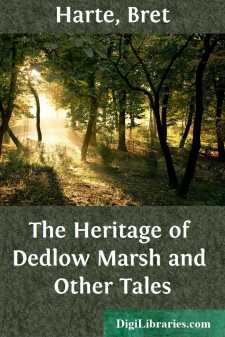Categories
- Antiques & Collectibles 13
- Architecture 36
- Art 48
- Bibles 22
- Biography & Autobiography 813
- Body, Mind & Spirit 141
- Business & Economics 28
- Children's Books 12
- Children's Fiction 9
- Computers 4
- Cooking 94
- Crafts & Hobbies 4
- Drama 346
- Education 46
- Family & Relationships 57
- Fiction 11826
- Games 19
- Gardening 17
- Health & Fitness 34
- History 1377
- House & Home 1
- Humor 147
- Juvenile Fiction 1873
- Juvenile Nonfiction 202
- Language Arts & Disciplines 88
- Law 16
- Literary Collections 686
- Literary Criticism 179
- Mathematics 13
- Medical 41
- Music 40
- Nature 179
- Non-Classifiable 1768
- Performing Arts 7
- Periodicals 1453
- Philosophy 64
- Photography 2
- Poetry 896
- Political Science 203
- Psychology 42
- Reference 154
- Religion 513
- Science 126
- Self-Help 83
- Social Science 81
- Sports & Recreation 34
- Study Aids 3
- Technology & Engineering 59
- Transportation 23
- Travel 463
- True Crime 29
Tennessee's Partner
by: Bret Harte
Description:
Excerpt
The Introduction
When Marshall's discovery caused a sudden influx of thousands of adventurers from all classes and almost all countries, the conditions of government in California were almost the worst possible. Though the Mexican system was unpopular and the Mexican law practically unknown, until other provision was made by congress, they had to continue in force. But the free and slave states were equal in number; California would turn the scale; there was a battle royal as to which pan should descend, a battle that the congresses of 1848 and 1849 left unsettled on adjourning.
Under these circumstances, it might be supposed that the worst elements would get the upper hand, crime become common, and anarchy result. Precisely the opposite happened. The de facto government was accepted as a necessity, and under its direction "alcaldes" and "ayuntamientos" were elected. But the mining-camps, which were in a part of the country that had not been settled by the Mexicans and were occupied by men who knew nothing of their system or laws, were left to work out their own salvation. The preponderating element was the Anglo-Saxon, and its genius for law and order asserted itself. Each camp elected its own officers, recognized the customary laws and adopted special ones, and punished lawbreakers. Naturally theft was considered a more serious crime than it is in ordinary communities. As there were no jails or jailors, flogging and expulsion were the usual punishment, but in aggravated cases it was death. Even after the state government had been organized, indeed, the law for a short while permitted a jury to prescribe the death penalty for grand larceny, and, in fact, several notorious thieves were legally executed.
The testimony of all observers is that the camps were surprisingly orderly, that crime was infrequent, and that its punishment, though swift and certain, leaned to mercy rather than rigor. Bayard Taylor, for example, who was in the mines in '50 and '51, writes: "In a region five hundred miles long, inhabited by a hundred thousand people, who had neither locks, bolts, regular laws of government, military or civil protection, there was as much security to life and property as in any state of the Union."
As these "miners' courts" were allowed after the organization of the state to retain jurisdiction in all questions that concerned the appropriation of claims, the miners but slowly appreciated that they had been shorn of their criminal jurisdiction. But that they did come to recognize that "the old order changeth, yielding place to new," is, in fact, shown by the very incident on which Harte based his of a lynching.
Spite of the autobiographic method that leads the casual reader to think that Harte was intimately connected with this early pioneer life and derived the material for his sketches from personal observation and experience, his is, in truth, only hearsay evidence. The heroic age was with Iram and all his rose ere he landed in 1854, a lad of eighteen. With no especial equipment for battling with the world, he had to turn his hand to many things, and naturally tried mining....


